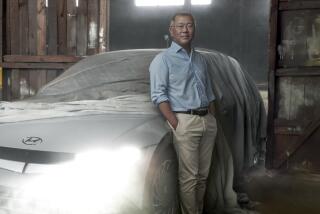Mitsubishi Taps Hyundai Exec as U.S. Auto Chief
- Share via
Mitsubishi Motors Corp., hoping to end an alarming sales slide, has replaced longtime North American Chief Executive Pierre Gagnon with Finbarr O’Neill, the man credited with engineering rival Hyundai Motor Co.’s unprecedented turnaround in the United States.
Officials at Cypress-based Mitsubishi Motors North America confirmed the management change Sunday. Representatives of Hyundai Motor America Inc., based in Fountain Valley, could not be reached for comment.
O’Neill, president of Hyundai Motor America for five years, reportedly said his goodbyes just before the Labor Day weekend began. His Hyundai-issued cell phone was out of service on Sunday.
The official word on Gagnon is that he resigned to pursue other interests.
His replacement comes just a few months after Automotive News, the auto industry’s leading journal, reported that Mitsubishi Motors North America had overloaded its dealers with vehicles they couldn’t move -- a tactic that angered dealers and cost them money but helped the company beef up its sales numbers.
O’Neill, a Hyundai Motor America corporate attorney who became president after a series of management bloodbaths that left him as the ranking American executive at the subsidiary of the South Korean automaker, is noted for his ability to work with dealers.
That will be crucial at Mitsubishi. The Japanese company not only has to rebuild dealers’ faith in top management but also must work closely with them to revamp its financing system.
Gagnon, who came from General Motors Corp.’s Saturn unit in 1997 to take the reins at Mitsubishi’s U.S. operations, guided the company to several years of record sales. Under his watch, Mitsubishi became a preferred brand in the sought-after youth market, second only to Volkswagen as the carmaker with the youngest buyers in the nation.
Although Gagnon improved Mitsubishi’s market visibility and image, his chief tactic -- easy financing and heavy incentives -- began backfiring recently.
Mitsubishi was unable to remain competitive in price alone once GM unleashed its incentives barrage after the Sept. 11 terrorist attacks two years ago. Ford Motor Co. and DaimlerChrysler’s Chrysler Group soon followed suit.
Instead of standing out for its deals, Mitsubishi became an also-ran in a crowded contest: Domestic automakers in the last two years have been offering almost twice the discounts as the Asian manufacturers -- an average of $3,000 per vehicle lately.
In addition, Mitsubishi’s easy financing plans have led to a ballooning default rate, especially among its youngest buyers.
The plans also alienated some buyers, analysts say, when they discovered that after delaying the initial payment for a year, a nice perk when the car was shiny and new, they suddenly owed more than the vehicle was worth when they wanted to trade it in on a new model after two or three years.
Defaults on Mitsubishi loans pushed the company into a $95-million loss on U.S. operations for the first quarter this year, analysts said.
And despite the terms it still offers -- Mitsubishi ads tout zero down, 0% interest and no payments until next year -- the company has seen sales slip 22% so far this year.
Hyundai, which almost knocked itself out of the U.S. market in the late 1980s because of the poor quality of its early vehicles, not only has become a rival but also has surpassed Mitsubishi in sales. Through July, Mitsubishi sold 161,738 cars and light trucks in the United States, while Hyundai sold 235,647.
Under O’Neill, Hyundai improved the designs and quality of its U.S. products and instituted an unprecedented 10-year warranty. O’Neill pushed hard for the warranty, arguing that only by guaranteeing the quality of its vehicles with a decade’s coverage of major powertrain components could the company erase its poor image.
DaimlerChrysler, which is believed by insiders to have instigated the management change, owns a controlling 37% interest in Mitsubishi and a 10.5% stake in Hyundai.
Mitsubishi and the Chrysler Group -- which is losing money for its German parent, $916 million through the first half of the year -- are collaborating on vehicle development.
O’Neill has had a taste of that at Hyundai, whose corporate parent in Seoul also owns Kia Motors Corp. and its Irvine-based U.S. arm, Kia Motors America Inc.
*
Times wire services were used in compiling this report.





